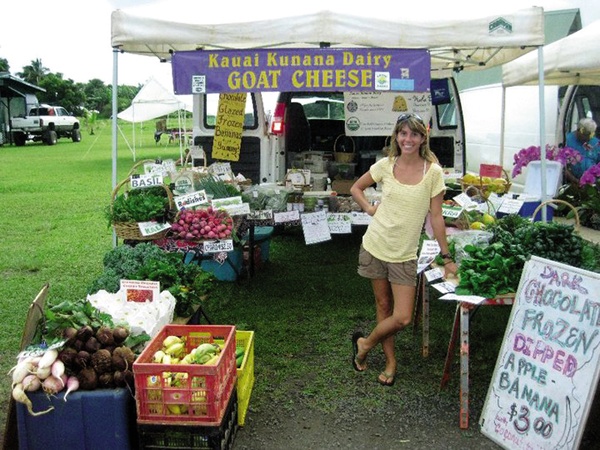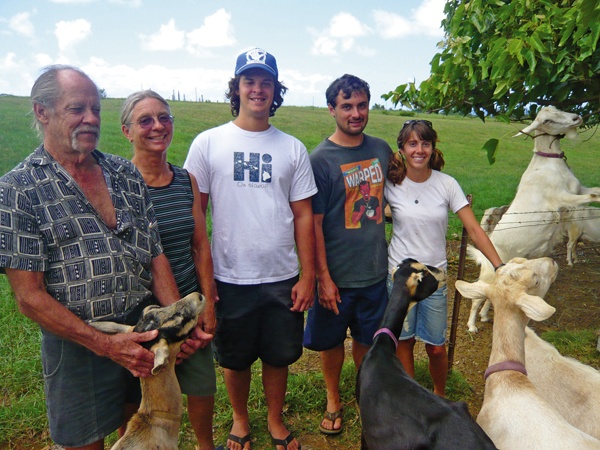Talk story with Louisa Wooton
An old Irish proverb says you can put silk on a goat, and it will still be a goat. It’s pretty safe to say, you can load goat farmer Louisa Wooton with silk, but she will still be a goat farmer — and a darn good one.
Wooton’s family owns Kauai Kunana Dairy goat farm on the North Shore, supplying several restaurants islandwide with their trademark goat cheese. They also do a heck of a lot of organic farming and have an array of seasonal value-added products.
But Wooton is more than a farmer. For many years she has been a leader in pushing for more organic farming and in helping to craft legislation for sustainable agriculture.
And then there is the whole debate on genetically engineered organisms. Here she is, raw and untouched:
• Why did you become a farmer?
I did not have a choice as a kid. My parents were farmers/ranchers in Texas. I was raising orphan baby goats and lambs from the time I was 5 years old.
When my mother wanted to buy new curtains, she would plant a huge vegetable garden and then send my brothers and me door-to-door in our tiny Texas town to sell squash, beans, tomatoes, etc.
My husband, Bob, also from farming background, and I began our life together farming on Kauai since 1979. We were married in 1981.
• Have you always been an
organic farmer?
My parents mixed conventional with traditional. My mother was composting in the 1950s. I studied agriculture at Santa Rosa Junior College in the late 1970s, and most of those courses mixed organic with conventional methods.
When we first started farming on Kauai in 1979, Bob and I used some conventional, chemical inputs along with organic methods. We became friends with Madeleine and Bob Emrick from Honua Farm in Kalaheo, and due in part to their influence, we switched over to organics in 1980.
• What does your farm produce? What kinds of value added products do you have?
We produce certified organic fruits and vegetables. Our goat cheese is our trademark, but it is not organic. Our value added menu is wide and seasonal, thanks to our dynamic son, Ryan, and Sarah, his equally amazing wife.
We make salsa, pesto, lemonade, several seasonal fruit drinks, banana bread, pumpkin bread, beeswax soap, beeswax lip balms, beeswax ointments, goat milk lotion, soap and hair products, two different herb vinaigrettes, Hawaiian chili pepper sauce, goat cheese cake, and our famous dark chocolate dipped frozen bananas.
• In the past, sugar and pineapple plantations dominated the island’s agriculture. What has changed since those plantations ceased?
The big squeeze on productive land has been the private landowners turning to seed production after sugar collapsed. Some amount of the lands are being used for alternative energy ventures such as biofuel and solar farms, but the bulk of the old cane land and water is being used to produce seed. The seed is for crops which are not even grown here. The money from this production mostly goes to companies that are not based here.
At least with sugar cane and pineapple, a greater percentage of the profits probably stayed here. Of course, the inevitable occurred, the monoculture was no longer profitable. (lots of reasons for that, e.g. labor costs, world markets, etc.) The same will hold true for the seed companies as GMO crops are becoming increasingly less productive, more expensive to grow, and losing worldwide acceptance.
• What are some of the pros and cons of the GMO industry on Kauai?
I honestly cannot think of much pro. The number of employees that benefit seems to be very small. Besides the large landholders, supporting business such as equipment, fertilizer companies, insurance companies, and of course the shipping lines certainly gain revenue from the industry. How much of the real money stays here? Does the state realize GE tax revenues if actual sales of the product are not occurring here?
Cons: Environmentally, we are going to have a lot of clean-up to do in the aftermath. We are facing that already with cleaning up the old mill sites and staging sites for sugar in Lihue, Kekaha and Koloa. The occupational hazards for the farm workers who handle these chemicals has yet to be measured. Safety procedures and protection aside, this stuff is poison, pure and simple.
• How is Kauai’s GMO industry affecting local organic farmers?
For us to have our corn and papayas certified organic, we cannot save our own seeds without having them tested for GMO contamination. While the seed companies do not grow papaya, they certainly grow corn.
Fortunately, the University of Hawaii does have “clean seeds” for organic papayas. GMO contamination for those areas on Kauai near the seed crops is real.
I know that we could never have organic honey anywhere from Lihue to Kekaha. The same is true for organic corn anywhere near those fields. GMO production on Molokai ended organic certification for one of the best lines of organic honey in the state. That is a small family business that suffered greatly.
Remember, GMO by definition is excluded in organic production (CFR7 National Organic Program Part 205.2).
• Should landowners growing crops which are not for food consumption be allowed tax breaks based on an agriculture dedication?
I think the question should be, should lands that are growing crops that are not sustainable and not being sold from here be given an agriculture-dedication tax break? What taxes are collected from seed production? The broader application of “food crops only” would hurt the flower and foliage industry, for instance, which have a long history here in the state.
• Can GMO crops feed the world?
No. Traditional farming methods with seed and crops that have been selected by the local agrarian societies are the answer for feeding the world. America’s attempts to feed the world have brought about results like the “dust bowl” in the 1930s.
The push in places like India to introduce GMO seeds and chemicals have had disastrous results. Mexican Indians who have more varieties of corn than the Polynesians have taro, have suffered terribly due to cross contamination of their indigenous, native varieties with GMO. This is really, really a tragedy. The selection of corn varieties for their favorable adaptations to climate, soil, growing conditions, etc. took hundreds of years.
GMO is an example of “quick fix, quick money” mentality, e.g. RoundUp Ready seeds can produce a crop that can be sprayed with herbicide along with the weeds in the field. “Sell ‘em the seeds, sell ‘em the poison.” But, predictably, ole Mother Nature has now developed RoundUp resistant weeds. So now move on to the next herbicide, until it, too, becomes ineffective. The number of countries that are feeding themselves without GMO is growing daily.
• Is it possible for Kauai to ever become sustainable in regards to food production? How could the county or the state government promote more sustainable agriculture on Kauai?
The cost of farm land is the biggest deterrent to food production in Hawaii. Unfortunately, food farmers cannot compete with the seed companies who can afford to lease land for thousands of dollars per acre from major landholders.
Kauai can be sustainable, but in addition to finding a solution to the cost of farmland, we would need to change our habits as a population. We should eat breadfruit, taro or yams instead of potatoes. We would return to preparing every meal for ourselves from locally derived sources rather than relying on prepared, frozen dishes from the big-box stores.
Hawaii could produce much of our own fertilizers and crop inputs from what we have locally: fish and meat waste, old coral deposits, seaweed, composting, etc. By adopting organic management techniques which rely on crop selection, rotation, companion planting, etc., we could minimize our dependence on oil-based chemicals, fungicides, pesticides.
If a person were to pick one thing to be a participant in the quest for sustainability, we would suggest buying your weekly produce at one of the farmers’ markets every week. With a couple of notable exceptions, we rarely see any of our elected officials at the farmers markets that we attend. Our leaders could lead by being “top shoppers” at these markets.
• You were one of the many hands involved in the farmer worker housing bill that got approved in 2010, after several lengthy council meetings. So far, only Ned Whitlock has got a permit for one of those structures. Is the bill working out for farmers?
Ask us that question in about two months. We are in the process right now and will soon find out if the powers that be are willing to take a sane, sound and sensible approach to interpreting that bill. The special use process is onerous, certainly not a model for the Paperwork Reduction Act. Remember, once the use permit is granted, the farmer still has to work out financing and obtaining the actual building permit.
• State Rep. Jimmy Tokioka recently said young children are not interested in becoming farmers, and when he spoke to their parents, they don’t want their children to become farmers either. How can this be reversed?
Isn’t that sad? Especially, the parents part. Children and teens that visit our farm are extremely interested in what we do and are ready to engage in activities that we have on field-trip days. Really, it is not so much that there is not the interest, but rather the lack of exposure to farm life in the youth of today.
In our farm’s history, we have had a number of young people live and work with us on the farm, a few for several years and many for several months. Whether they make it their life’s work or not, we see that they at least come away with appreciation for what it takes to be a farmer. Sure, there is hard work involved, but hard work should be relative to any profession, really.
It is doubtful that many farmers nowadays would not want their children to follow in their footsteps. We are extremely proud to have one of our sons choose this path. But we are equally proud of our other son, who also was raised working on the farm, because he has developed that same sense of dedication and strong work ethic in his present occupation. That is a direct result of growing up on a farm.



